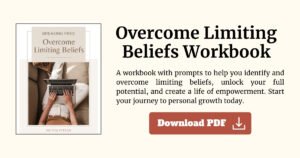Dr Itai Ivtzan
In search for safety, people focus their identity on an idea of their self, i.e. on the mental abstraction called Ego or Personality. All the information concerning one’s self and the world can be defined in terms of aware or unaware assumptions, or ego concepts, that colour one’s personal experience, for example:
- I’m not creative, I have no imagination
- I am an intelligent person
- I can never do what I want to do
- I’m very sensitive / insensitive
Or as beliefs about the world, such as:
- There is something wrong about money
- Performing arts are a profession that will take me nowhere
Before you continue you might like to consider our free worksheet on exploring “Overcome Limiting Beliefs”. Please download this worksheet here.
Note that positive and negative assumptions are both part of our self. On a psychological level, it would be more beneficial to adhere to positive assumptions about our self than to negative ones. Such ego concepts would make you more resilient psychologically. However, from a spiritual perspective this is not the case. From the spiritual point of view, any such assumption about your self would be perceived as being part of the illusion that stands in your way to life as it is. Be it a positive or a negative assumption, it would still colour your glasses and somehow distort the experience of the moment. From a spiritual point of view, freedom would only be achieved if we had the choice of taking off the glasses, and removing the concepts that colour reality with positive or negative assumptions.
Jane Roberts invites us to imagine the ego as a fence through which we see the world. We make an effort to capture as much as possible, but our vision is limited to the cracks and spaces between the poles: “You must first recognize the existence of such barriers, you must see them or you will not even realize that you are not free, simply because you will not see beyond the fences; they will represent the boundaries of your experience” .
This quotation illustrates the role psychology plays in the spiritual journey. Roberts advises us to first recognize the ego concepts that are floating around in our minds. Those assumptions you make about your self, about other people, and about the world around you.
You are free to experience the adventures that life is offering you only as far as your personal “fences”, your ego concepts, allow you. As long as you do not recognize the fences and their influence you would not be able to realize how limited your experience is. Although your ability to experience life “as it is” could be unlimited, your interpretation of the experience stands in the way, and restricts this original potential. Remember that these assumptions, your personal “fences”, are all mental concepts, that is, part of your own psychological experience. In the course of the psychological journey you will discover your mind and its assumptions. This journey is essential to the spiritual transcendence that enables you to pull down the “fences” and experience life as it is. Transcendence, in this context, means bypassing mind processes, and relating to life directly, free of assumptions.
I have heard students say that their life has lost its sense of adventure, the feeling that anything is possible. This could be the result of accumulated ego concepts. With time, the list of assumptions grows longer, curbing our experiences. Why this change? For a child, every stimulus is a celebration; every moment is an invitation for an adventure. Children sense intuitively that there are no bounds to their experiences, and they celebrate this freedom. You may recall that unrestrained sense of liberty, and long to recapture it. In many ways, regaining that child-like attitude is the essence of the spiritual journey. This child-like experience has been stifled by ego concepts. Transcending these assumptions and ideas could take us back to that original, free space.
Dr Itai Ivtzan is passionate about the combination of psychology and spirituality. It makes his heart sing. Isn’t this an amazing prospect? His main areas of research are mindfulness, spirituality, and wellbeing. Accordingly, he has been investing much time in studying mindfulness academically, writing books about it, teaching it, and running meditation teacher training online. Offering the gift of mindfulness to others is a deeply rewarding experience; would you like to learn how to become a meditation teacher? Check out his mindfulness certification online to find out more.
If you’re ready to break free from limiting beliefs and expand your experience of life, download our free Overcome Limiting Beliefs Workbook here to begin your journey towards greater freedom and self-awareness.






